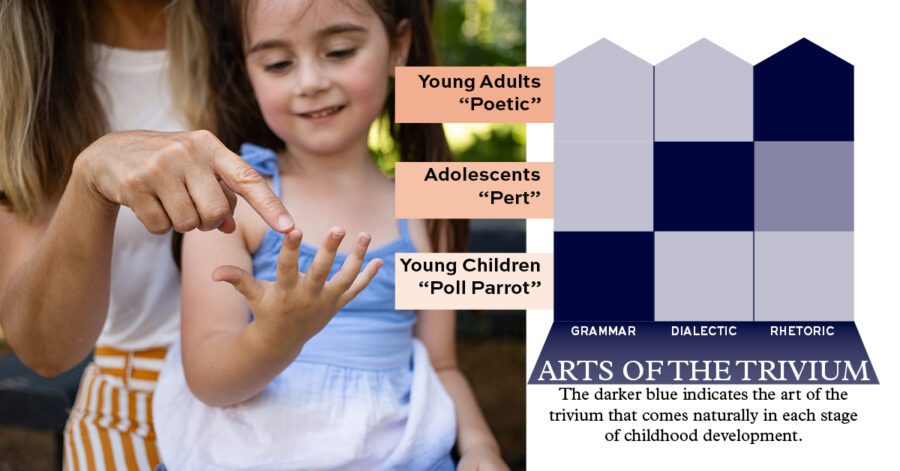In the pamphlet “Of Education,” John Milton, a seventeenth-century Christian poet, thinker, and statesman, wrote that “the end then of learning is to repair the ruins of our first parents by regaining to know God aright, and out of that knowledge to love him, to imitate him, to be like him.”
As Christian parents, this is surely our aspiration. The classical model of education places our children on this path by teaching them how to think critically, to write and speak persuasively, and to apply their trained minds to reclaiming knowledge for Christ.
Classical, Christian Education
Classical education is steadily gaining momentum as more and more classical, Christian schools open around the country. Likewise, many homeschool families have turned to this model as they seek to educate their children with excellence.
In her 1947 speech, “The Lost Tools of Learning,” Oxford professor Dorothy Sayers outlined the classical model of learning and encouraged educators to pursue this time-tested method.
Download “The Lost Tools of Learning” from the Classical Conversations® bookstore for free or read the speech in “The Lost Tools of Learning: From Dorothy Sayers to Leigh Bortins”
Furthermore, the classical model follows the biblical pattern found in Proverbs 24:3–4, which identifies three levels of learning: knowledge, understanding, and wisdom.
This progression of spiritual maturity naturally coincides with the emotional and mental maturity of students at three different stages of learning.
The Classical Model
To summarize briefly, the classical model occurs in three stages of learning known as the trivium, which is Latin for “three roads.”
Grammar
Grammar, the first stage, roughly corresponds to the elementary school grades, lasting until the student is eleven or twelve years old. This stage involves the accumulation of knowledge through memorization of the rudimentary facts of any subject.
Dorothy Sayers called this the “Poll-Parrot” stage to reflect the natural tendency of young children to repeat what they are hearing and learning. Memorization comes easily to these young students and provides a crucial foundation for the higher orders of thinking.
A wise educator chooses to work with these natural tendencies by providing the students with rich, useful information to memorize. Therefore, a grammar student is chiefly absorbed in memorizing the rudimentary facts and principles of any subject, including history, math, science, Latin, geography, and English grammar.
Classical Conversations partners with families of grammar students through our Foundations communities.
Learn more about the Foundations program.
Dialectic
The second trivium stage, dialectic (or logic), flourishes in children ages twelve to fourteen.
At this age, which Sayers called the “Pert” stage, students naturally become interested in debating and questioning everything from political boundaries to elections and parental rules. What appears to be a tendency in students to argue, or even to talk back, is really a desire to systematize their thoughts and to achieve understanding of the facts they have accumulated in the grammar years.
Instead of squelching the desire to argue, the classical model complements their natural tendencies by teaching them formal logic and debate so that students learn to reason and argue clearly, respectfully, and persuasively. In preparation for their own debates, they must be equipped to recognize and avoid errors in logic.
Parents and tutors can lead students through the reconciliation of big ideas by asking questions that clarify and refine thoughts and by conversing about a wide range of ideas in literature, current events, politics, and philosophy. The classical, Christian curriculum satisfies students’ increasing desire to think dialectically by teaching analytical subjects such as algebra, formal logic, and debate.
Beginning with the Essentials program, Classical Conversations helps parents and students to think dialectically.
Learn more about the Essentials program.
Rhetoric
Grammar and logic, the first two stages of a classical education, have prepared students for the third stage—rhetoric.
Sayers called this the “Poetic” stage in honor of the students’ deep desire for creative self-expression. By the end of their high school years, students should be able to speak and write persuasively and eloquently about any topic they have studied. When they advance to rhetoric, students have stored up a core of knowledge and have learned to think critically about those facts and ideas. Hence, they are ready to practice the art of communicating their ideas to others.
Classical, Christian education fosters this practice through rhetoric—the study of oral and written communication techniques. This includes both organization and stylistic presentation of the student’s thoughts. By the end of this stage, students should demonstrate wisdom through their ability to speak and write persuasively and eloquently about any topic they have studied.
In Classical Conversations’ Challenge programs, parents and students practice rhetoric.
Learn more about the Challenge programs.
Rhetoric and Words
One of the fundamental premises of a classical education is that words are important.
For the Christian, this is especially true. The Bible tells us that Jesus is the “Word made flesh.” During the logic stage, we teach students not to fall prey to the words of others. During the rhetoric stage, we teach students to captivate others with their words. No other skill is so pivotal to the spreading of the gospel as the ability to speak and persuade. Of course we rely on the power of the Holy Spirit, but we arm our students with the proper tools.
Our students should always be prepared to give an answer for their faith. Graduates of a classical home school can use their trained minds to reclaim our culture and spread the gospel.
Hopes for a Good Education
Armed with this excellent classical model, perhaps we can realize Milton’s hopes for a good education: to stir up the students “with high hopes of living to be brave men and worthy patriots, dear to God, and famous to all ages.”
Would you like to learn more about classical, Christian education?
Read: “The Classical Arts” in our catalog.
Looking for more resources to learn about classical, Christian education?
Read: What Are the Five Core Habits of Grammar?, What Are the Five Common Topics of Dialectic?, and What Are the Five Canons of Rhetoric?





